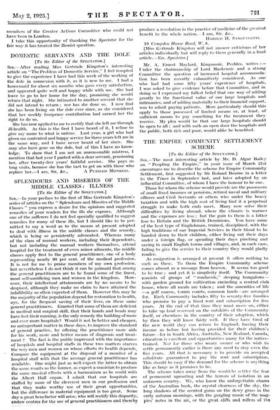SPLENDOURS AND MISERIES OF THE MIDDLE CLASSES : ILLNESS
[To the Editor of the SPECTATOR.] SIR,—In your preface to the first of Miss Gertrude Kingston's series of articles on the " Splendours and Miseries of the Middle Classes " you express a desire for the opinions and suggested remedies of your readers for the ills she exposes. Although one of the sufferers I do not feel specially qualified to suggest remedies for many of these ills, but I should like to be per- mitted to say a word as to the means at present adopted to deal with illness in the middle classes and the remedy, which is being so persistently advocated. Whereas many of the class of manual workers, including their dependents, but not including the manual workers themselves, attend hospital for the treatment of even minor ailments, the middle classes apply first to the general practitioner, one of a body representing nearly 90 per cent. of the medical profession. It is not for me to praise members of my own profession, but nevertheless I do not think it can be gainsaid that among the general practitioners are to be found some of the finest, most self-sacrificing men and women in the kingdom. More- over, their intellectual attainments are by no means to be despised, although they make no claim to have attained the infallibility so often expected of them. However this may be the majority of the population depend for restoration to health, aye, for the frequent saving of their lives, on these same general practitioners. Granted that some of them are deficient in medical and surgical skill, that their hands and heads may have lost their cunning, is the only remedy the building of more and ever more hospitals? Would it not be better and cheaper, no unimportant matter in these days, to improve the standard of general practice, by offering the practitioner more aids for his work, more and better means of diagnosis and treat- ment ? The fact is the public impressed with the importance of hospitals and hospital staffs in these two matters starves the very men and women on whose efforts its health depends. Compare the equipment at the disposal Of a member of a hospital staff with that the average general practitioner has available. One might just as well expect the latter to obtain the same results as the former, as expect a musician to produce the same musical effects with a harmonium as he could with the Albert Hall organ. I admit that our hospitals are staffed by some of the cleverest men in our profession and that they make worthy use of their great opportunities, but the difference in material equipment is too great. Some day a great benefactor will arise, who wilt rectify this disparity, endow centres for the use of general practitioners and thereby
produce a revolution in the practice of medicine of the greatest benefit to the whole nation.—I am, Sir, &c.,
[Miss Gertrude Kingston will not answer criticisms of her articles individually but will reply to them generally in a final article.—En. Spectator.]
Mr. A. Ernest Maylard, Kingsmuir, Peebles, writes :- Under the chairmanship of Lord Mackenzie and a strong Committee the question of increased hospital accommoda- tion has been recently exhaustively considered. As one who had had some fifty years' experience of hospitals, I was asked to give evidence before that Committee, and in doing so I expressed my fullest belief that one way of adding greatly to the functional value of our large hospitals and infirmaries, and of adding materially to their financial support, was to admit paying patients. More particularly should this apply to those possessed. of limited means or, at least, of sufficient means to pay something for the treatment they receive. My plea would be that our large hospitals should be open to all ; and with such an open door the hospitals and the public, both rich and poor, would alike be benefited.










































 Previous page
Previous page